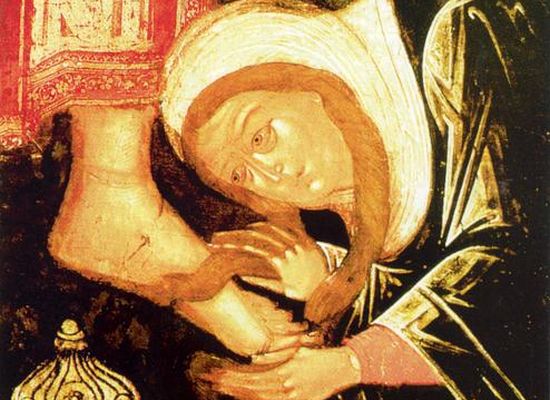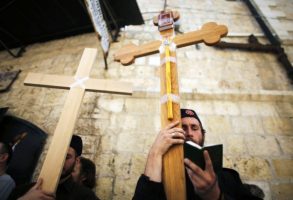Today precedes the great days of Holy Week. It precedes the Last Supper. It precedes the saving Passion and Death on the Cross of our Lord Jesus Christ, Holy Saturday, and the Feast of all feasts —Pascha.
Like all Divine services held in the church, today’s order of service opens the Mystery of the Kingdom of God to all who are seeking truth. The mystery of salvation is revealed.
Today, in the liturgical hymns, two people are contrasted. A Harlot and an apostle chosen by Christ, who heard all that the LORD had said, but then betrayed him. Today, is a remembrance of his betrayal — the betrayal of Judas. Today is a remembrance of a sinful harlot, spending time in a “moonless night of sin”, as stated in the sticheron of Saint Kassia, who found forgiveness from God, as she received salvation, anointing His feet with precious oil of myrrh.
Images of that traitor and this woman give us cause to ponder where we are going after the conclusion of the service — in one direction or another? We will either be with this harlot of whom they sing about in church every Great Wednesday — the same who the Lord Himself says is remembered and always will be remembered — or we will be with Judas, who the Church will chastise tonight with dreadful words for his betrayal.
Let’s not talk about Judas, but let us remember his image, because we need not say, “I did not betray you,” as did the apostle Peter before the Death of his Master on the Cross, because we do not have the strength to resist evil and temptation. Let’s also not think that we are better than him and that we could never have betrayed Christ for 30 pieces of silver. We don’t realize that we do it all the time. We abstract from God for pleasure and to indulge passions.
It is probably better to tell about the woman, of whom they sang hymns today and that the Lord said would be remembered by the Church. What repentance did she bring to God so that she atoned for her sins? She bought costly myrrh oil, that was very expensive for its value. She probably spent all her money. She brought it and anointed the feet of Jesus.
As St. Kassia says, who wrote amazing songs, she “took the place of myrrh bearer”. Being a harlot, being a sinner, she preceded the wives of myrrh bearers, who were clean and followed Christ, in anointing the body of Christ. She brought this ointment, poured it on his His feet and wiped them with the hair from her head. What an amazing way to serve God. She spent all she had on the fragrant myrrh oil, which filled the room in the Pharisee’s house that was holding guests and the Lord with its fragrance. She manifested her love for Christ.
Of course, dear brothers and sisters, we all need to show and express our love for Christ in our lives. We try to show this love with you in executing the morning and evening prayer rule. Through force and yawning, sometimes without realizing what we read, we chant words of prayer. It should be done, even if we don’t have a prayerful the heart. This is an expression of our love and devotion to God.
This love should be expressed not only in the reading of prayers and not only in the fact that we kept the fast. We didn’t eat meat and milk, but ate seafood and tried to make it more tasty and to choose something delicious. This was also an expression of the measure of our love for God. Maybe someone fasted on the first day or two of the week and kept a strict fast on Holy Week … I mean, of course, it is not that we chose something more tasty, but that we did not eat meat, eggs, milk and fish too. This is also an expression of our love for God. We must be aware of our actions. Fasting is not just a method of self-improvement or a way to lose weight, it is an expression of our love for God.
In addition, we also need to serve Christ with our entire life. The fragrance of myrrh, which the woman bought, is also an expression of love. We must fill the temple with fragrance — our prayers, our singing, and our service to God. This service can be very different.
Those with talent can sing hymns to God and compose new ones, as do some of our clergy, for example. As the children today did, who sang wonderfully. You can serve God as St. Kassia, who wrote wonderful stichera and words. You can serve as the apostles, who conveyed in words what they had heard from Christ.
This is very important and very necessary for those people who do not know God, because it is impossible to express faith in mathematical rules or dry formulas. Faith and the Good News is expressed in verse, is expressed in the talents of people who are involved in the arts, is expressed in icons, and is expressed in the melodies and words of hymns. When the soul of a man is united with God, he sings to God. If he has such a talent, it cannot be buried in the ground. He needs to sing in the choir, to compose verses, to preach Christ, to engage in missionary work.
One needs to be careful, though, because our preaching can be wearisome (I am sorry that I’ve been talking to you now for so long). Our singing can be unpleasant to others’ ears. We have a lot of people want to sing, but they do not realize that they eventually “step on a large animal’s ear” and simply do not have the necessary ability. They don’t always sing properly and tire those around them, rather than helping them.
Some sermons are said to be tiresome and unpleasant to hear. Some reject the efforts of missionaries from God, and won’t approach Him. Some icons don’t inspire the desire to venerate them and can only be venerated with closed eyes. It is necessary to understand and perceive this, and to be humble.
One needs to ask: is what I am doing useful to others. Do not fall into the delusion that I am performing this ministry in the Church. For example, I read well, and when I read, I have such wonderful thoughts, and I enunciate words so well and I have such great intonation. So, since I pronounce words well, and my voice is beautiful, everyone listens to me. Actually, in fact, it may be that my voice is somewhat unpleasant and discordant with the state of the soul, having a feeling and tone that others do not want to hear. You need to be careful here.
Of course, we need to think about how to make our worship services beautiful. Deacons should try to study the order of service in advance, and should even go to church in this way, paying attention to the clothing, so that all this expresses beauty, just as the fragrance of the myrrh filled the room in the house of the Pharisee. This is also an expression of our love for God. This is not hypocrisy or formalism. This desire to serve God is a special skill. It is liturgical.
Although, of course, the art with which we aspire to please Christ and express our love to Him is like a withered flower. The prayers that we read with you, the prayers of the holy people who lived before us, the words we remember and love, they also … are but withered flowers. There is a certain life that is above every art and above all flowers.
The Lord talks about it in the Gospel, when discussing works of charity that should be done in secret. People committing acts of charity; people with peace in their hearts; people showing their love not with words, but with deeds; of course, is above all art. You and I need to imitate them. A person who sings in the choir and has the gift of poetry, should also help the needy and care for the sick — to serve God with love. This life, which is more important than anything else, should be dedicated to God.
Today, I cautioned the priests that we will be recorded on camera, so that they behaved cautiously and so that nothing bad was recorded — but dear friends, the Lord records all that we do on camera. Always. And we will all review the recording, when we are at the Last Judgment. And it will likely be more frightening than if they showed something I did wrong today on TV, saying, look the bishop doesn’t know how to do this or that. It is completely unimportant what people think and how they will criticize us.
At the Last Judgment, though, we will be shown a record of our lives — all our words, our actions, our secret thoughts. It will be terrible. All of this will be recorded. All of this will be visible in the end times, and it will be open in front of everyone. Of course, then we will be ashamed of the way we live and what we think, as they say. We will be ashamed that some trifle has resulted in a great passion, which nests in our soul.
The myrrh, tears, and hair, with which the harlot wiped the Savior’s feet is an expression of remorse. After that, she probably no longer committed the terrible sins with which she lived and abandoned the sinful pleasures that, like a sticky web, entangle us all.
Translated from the Russian.






















